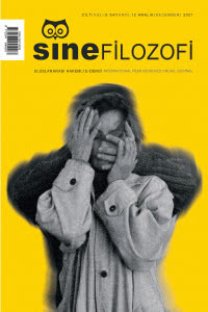Evaluation Of The Concepts Goodwill and Duty, Considering The Cinematographic Narrative Through The Film “Dept”
The intellectual process that cinema reveals with visual and auditory images is unique. While visual and auditory images triggers personal emotions in the audience, they also inflame intellectual activity starts in mind. Concepts, which are the most basic components of the thought system, that provides new expansions. This also encourageous performances of contemporary cinema directors and enables the production styles of films to be autonomous. Renewals in the audience’s view of the phenomenon of cinema paved the way for directors who, by producing philosophy, make the audience a partner in their work in an intellectual sense. The various choices in the use of cinematographic elements by the directors create a serious diversity in the narrative. In this context, the fact that when the sound and visual images in the movies are different from the usual style, that may cause an interesting and stimulating effect. Such marginal choices of cinematography leads to the production of new expansions of the concepts desired to be shared with the audience through films. Based on this idea, the study tries to conduct a discussion on the concepts of goodness and evil in the movie Borç (Vuslat Saraçoğlu, 2018) within the framework of cinematographic elements. These two concepts are tried to be discussed on the basis of moral philosophy. The philosophy that the audiences will create in mind with their own experiences can also be versatile. Because these two concepts are very prone to multiple meanings. Being a good person or being a bad person are concepts that can differ with one's experiences and life conditions. The film Debt deals with these concepts in depth and from multiple perspectives. The aim of the study is to make an evaluation of what kind of questioning and how to approach to these concepts from the viewer's point of view when cinematographic elements are used differently from the known ordinary forms.
Anahtar Kelimeler:
Film Philosophy, Morality, Ethic, Good, Evil
Evaluation Of The Concepts Goodwill and Duty, Considering The Cinematographic Narrative Through The Film “Dept”
The intellectual process that cinema reveals with visual and auditory images is unique. While visual and auditory images triggers personal emotions in the audience, they also inflame intellectual activity starts in mind. Concepts, which are the most basic components of the thought system, that provides new expansions. This also encourageous performances of contemporary cinema directors and enables the production styles of films to be autonomous. Renewals in the audience’s view of the phenomenon of cinema paved the way for directors who, by producing philosophy, make the audience a partner in their work in an intellectual sense. The various choices in the use of cinematographic elements by the directors create a serious diversity in the narrative. In this context, the fact that when the sound and visual images in the movies are different from the usual style, that may cause an interesting and stimulating effect. Such marginal choices of cinematography leads to the production of new expansions of the concepts desired to be shared with the audience through films. Based on this idea, the study tries to conduct a discussion on the concepts of goodness and evil in the movie Borç (Vuslat Saraçoğlu, 2018) within the framework of cinematographic elements. These two concepts are tried to be discussed on the basis of moral philosophy. The philosophy that the audiences will create in mind with their own experiences can also be versatile. Because these two concepts are very prone to multiple meanings. Being a good person or being a bad person are concepts that can differ with one's experiences and life conditions. The film Debt deals with these concepts in depth and from multiple perspectives. The aim of the study is to make an evaluation of what kind of questioning and how to approach to these concepts from the viewer's point of view when cinematographic elements are used differently from the known ordinary forms.
Keywords:
film, film philosophy, morality, ethic,
___
- Arısoy, E., & Osmanoğulları, F. Vuslat Saraçoğlu İle Borç Filmi Üzerine Söyleşi (2021) Sinefilozofi, 6(12), 1175-1182.
- Balázs, B. (2013) Görünen İnsan, Say
- Bazin, A. (2011), Sinema Nedir? Çev.İbrahim Şener, Doruk
- Bergson, H., (2005) Matter and Memory, Dover
- Burch, N. (1981). Theory of film practice (Vol. 507). Princeton University Press.
- Carroll, N. (1999) , Philosophy of Art, A Contemporary Introduction, Routhledge
- Ceylan, N.B. (Director) (2011) Bir Zamanlar Anadolu’da (Film), Zeyno Film
- Chion, M.(1999), The Voice in Cinema, çev.Claudia Gorbman, Columbia Univ. Press
- Colman, F. (2011) Deleuze & Cinema, The Film Concept, Berg
- Cox, D., Levine, M. (2018) Filmle Düşünmek, Felsefe Yapmak ve Film İzlemek, Çev. Onur Orhangazi, Ütopya Iñárritu, A.G. (Director) (2014) Birdman (Film), Alejandro G. Iñárritu, John Lesher Arnon Milchan, James W. Skotchdopole, USA Coşkun, M. (Director) (2013). Yozgat Blues (Film), Türkiye
- Deleuze, G. (1988) Bergsonism, Zone Books, NY
- Deleuze, G., Guattari, F. (2017) Felsefe Nedir?, YKY Yayınları
- Deleuze, G. (2021), Sinema I, Hareket-İmge, Norgunk
- Deleuze, G. (2021), Sinema II, Zaman-İmge, Norgunk
- Eisenstein, S.M. (1984) Film Duyumu, çev. Nijat Özön, Payel
- Formosa, P. (2010). Kant on the Highest Moral-Physical Good: The Social Aspect of Kant's Moral Philosophy. Kantian Review, 15, pp 1-36 doi:10.1017/ S1369415400002351
- Hartman, R. J. (2002) Circumstantial and Constitutive Moral Luck in Kant's Moral Philosophy. European Journal of Philosophies, Ohio, USA
- Yayın Aralığı: Yılda 2 Sayı
- Başlangıç: 2016
- Yayıncı: Serdar Öztürk
Sayıdaki Diğer Makaleler
Bilim Kurgu ve Apokaliptik Filmlerde Aşkın Arayışı
Sorry We Missed You Filminde Yabancılaşma: Karl Marx Perspektifinden Bir Değerlendirme
Seda Dilek GÖĞÜŞ, Hakan KILINÇ
Estetik Varoluş ve Umutsuzluk: Le Feu follet
Ömer Kavur’un Erken Dönem Filmleri: Varoluşçu Arayışların Sineması
Zorbalığın ve Damgalanmanın Sinemasal Suretleri: Bilmemek Filmi
Dönüştürücü, Eleştirel ve Politik Bir Sinemanın İmkânı: Guy Ernest Debord Sineması
Kaptan Fantastik (2016): Kapitalizm Kıskacında Başka Bir Hayat Mümkün mü?
Deniz YÜCEER BERKER, Cem YILDIRIM
Sinemada Kaos Felsefesi: Bay Hiçkimse Filmi Üzerine Bir Analiz
